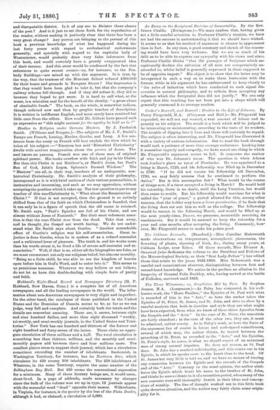Studies in Religion under German Masters. By J. Frederick Smith.
(Williams and Norgate.)—The subjects of Mr. J. F. Smith's Essays are Franck, Lessing, Herder, Goethe, and Lang. A few sen- tences from the essay on Franck will best explain the view which he takes of his subject ;—"Emerson has said Historical Christianity' dwells with noxious exaggeration about the person of Jesus. The soul knows no persons. Franck was one of these men of original spiritual power. His books overflow with faith and joy in his Christ. But then this Christ is not Matthew's, or Mark's Jesus, but Paul's Son of God, John's Logos, Spinoza's Eternal Wisdom." The " Masters " are all, in their way, teachers of an undogmatic, non- historical Christianity. Mr. Smith's analysis of their philosophy, interspersed as it is with brief notices of their various personalities, is instructive and interesting, and such as we may appreciate, without accepting the position which it takes up. The test question to put to any teacher of this neo-Christianity is, "What about the Resurrection of Christ ? " If that is not accepted, then the ground is so entirely shifted from that of the faith on which Christendom is founded, that it can only be in a figure of speech that the old name is retained. Mr. Smith says, "Paul's Epistles are full of his Christ, and are almost without Jesus of Nazareth." But their most vehement asser- tion is that the man Christ rose from the dead. Take that away, and he thought the Gospel not worth having. We do not under- stand what Mr. Smith says about Goethe. "Another remarkable effect of Goethe's religion was his self-renunciation. Great in- justice is done Goethe, when be is spoken of as a refined sensualist and a cultivated lover of pleasure. The truth is, and his works more than his words attest it, he lived a life of severe self-restraint and re- nunciation." Well, if that is so, either all the biographies are false, or we must reconstruct not only our religions belief, but also our morality. "Being as a little child, he was able to see the kingdom of heaven open before him in God's Word, and to enter into it." This seems to us pernicious nonsense. Whatever we may believe or not believe, do not let us have this double-dealing with simple facts of purity and faith.


































 Previous page
Previous page